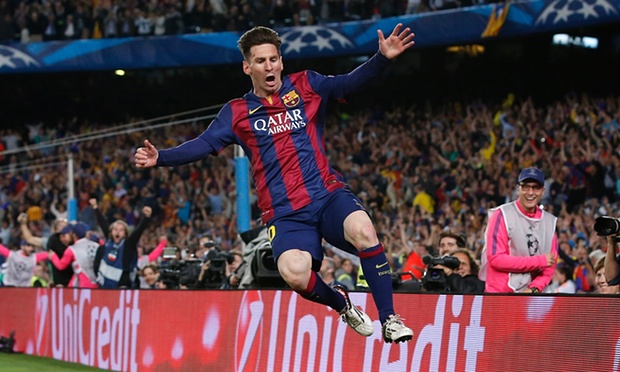Lionel Messi surpasses Cristiano Ronaldo as the world`s best footballer

Yes, it’s that time again. Once again the Guardian’s panel of judges has culled the longlist, consulted its network of contacts, pored over the stats, done some random googling and after an exhaustive voting procedure compiled its list of the top 100 footballers in the world.
In keeping with the spirit of the granddaddy of them all, France Football’s original pre-Fifa award, our panel of 123 judges from 49 countries cast their votes in a secret ballot, taking into account only form and achievements over the last year. At the end of which we have a new No1, a fascinatingly mobile field full of new entries, bolters and tumbling stocks, and a very clear indication of where the power base lies currently in both club and international football.
First the headline news. Lionel Messi is reinstalled as the scampering little twinkle-toed inside-forward at the top of the Guardian tree, moving up one space from No2 in 2014 and doing so with an extraordinary swing of the vote, 74% of our judges giving him top spot. Understandably so too. After a disappointing World Cup and a sense that injury and weariness had taken its toll, Messi’s 2014-15 season was both a genuine, through-the-roof return to form, and evidence of his ability to adapt to a slightly different but equally devastating role as a mature creative footballer in a team overloaded at its front end with attacking talent.
Unsurprisingly, for the first time the No1 player is joined in the top four by two men playing almost the same position for the same club, as the supreme achievements of Barcelona’s wonder-trident leaves Messi, Luis Suárez and Neymar all clustered around the peak.
Predictably it is Cristiano Ronaldo, last year’s winner and this year’s No2, who manages to split them, although only narrowly on the voting. Neymar, with three trophies in the year, a goal in the Champions League final and a highlights reel of sublime, frictionless creativity might wonder exactly what he has to do to edge ahead of the world’s most famous footballer. Just wait, perhaps: Neymar is, after all, the only player in the top 10 under the age of 24, a symptom of a slight ossification at the top of the list.
This year the world’s best players have largely remained the world’s best players, tribute both to their sustained consistency and the tendency for talent, now more then ever to cluster at and clog the richest clubs, a self-supporting oligopoly where the best play with the best, parcel the titles out among them, and preserve their own elite longevity.
Zlatan Ibrahimovic’s feat in remaining a supreme striker at the age of 34 – the oldest member of the top 20 in this year’s poll – is only slightly shaded by the fact a boundlessly wealthy PSG team have won the domestic league by a street the last three seasons and are way ahead already this term.
As ever there is a different kind of fascination with the lower reaches of the top 100, with plenty of intriguing new entries. A year and half ago Riyad Mahrez was playing in Ligue 2 with Le Havre. This year he has been voted the 97th best player in the world, swirling about with a mix of new entries and heavy fallers, most dramatically Mario Götze, king of the world last year who falls from 24 to 80. Continuing the Leicester-gatecrash theme Jamie Vardy is a new entry at 68, reward for a sensational domestic goalscoring run and a thrilling year in the Premier League.
The curiosities keep coming. Anthony Martial and Raheem Sterling are a Premier League reality check at 66 and 62: close to £100m of talent (new TV deal prices) but with a position on this list more commensurate with their youth and progress. Above them Philippe Coutinho at 46 and Harry Kane – by far the most buoyant Englishman on this list – are significant new entries. Kane scored his first Premier League goal in November last year. This year he’s one place above Ángel Di María, a situation only a particularly pumped Tim Sherwood, or perhaps Chas & Dave, might have predicted last Christmas.
After which we’re into the fine-margins scrap for the top 30. Mesut Özil, the Premier League’s assist king, top No10 and general strolling princeling, is a slightly jarring entry at 26, Kevin De Bruyne a sensational highest new entry at No14, tribute to a storming half-season at Wolfsburg and a decent start at Manchester City. Paul Pogba, the youngest player in the top 50, is a purposeful climber, up 20 to 11. Robert Lewandowski comes closest to storming the bastille and forcing his way in among the established powers with a 25-place rise to fifth.
To nobody’s great surprise it was another thin year for the English, with four players overall and just one – the mercurial Kane – in the top 50. Spain were the most prominent again, with 16 La Liga players included overall, joint top with the Premier League. Bayern Munich once again topped the club rankings with 12 players here, ahead of Real Madrid and Barcelona on 11.
It is a concentration of power that stretches beyond simply club ties. The entire football-centric continent of Africa, population 1.1 billion, has just five players in the top 100, one more than Belgium. Indeed it is remarkable in itself that it should seem so unremarkable that only Carlos Tevez, Andrea Pirlo, Hulk and Alex Teixeira in the top 90 here play outside the main European leagues in England, Spain, Germany, France and Italy.
Not that this financial stratification seems to have diluted, just yet, the quality on show. If this year’s top 100 serves any wider purpose it is simply to emphasise once again the enduring appeal of a sport that can still produce a list so crammed from peaks to foothills with pure, unsullied individual talent.















































